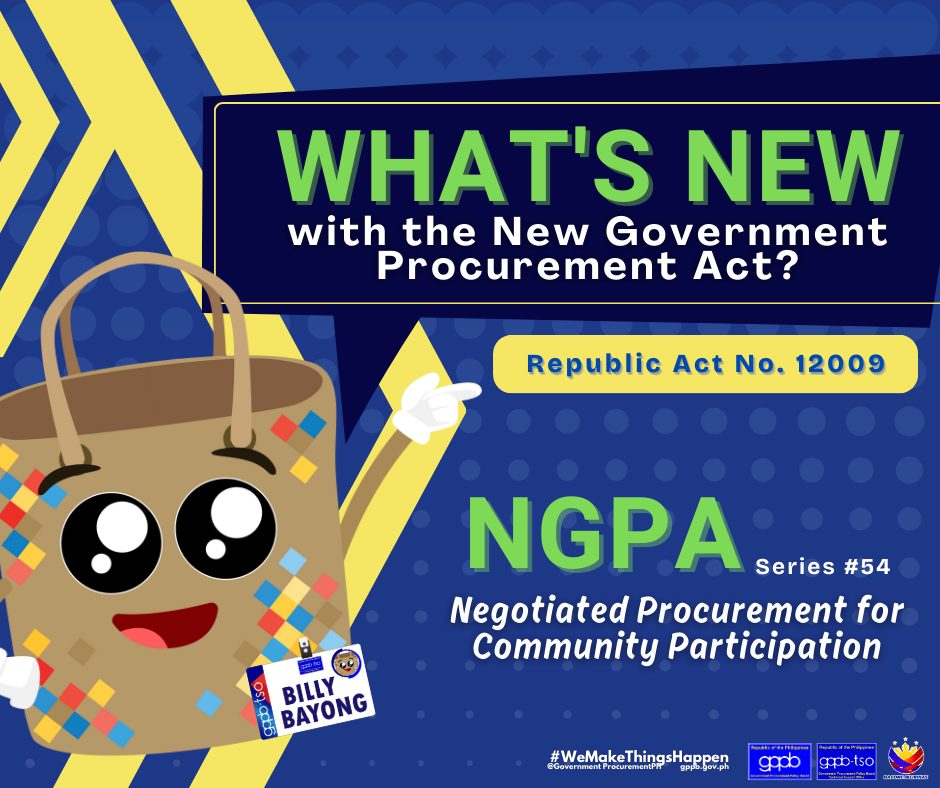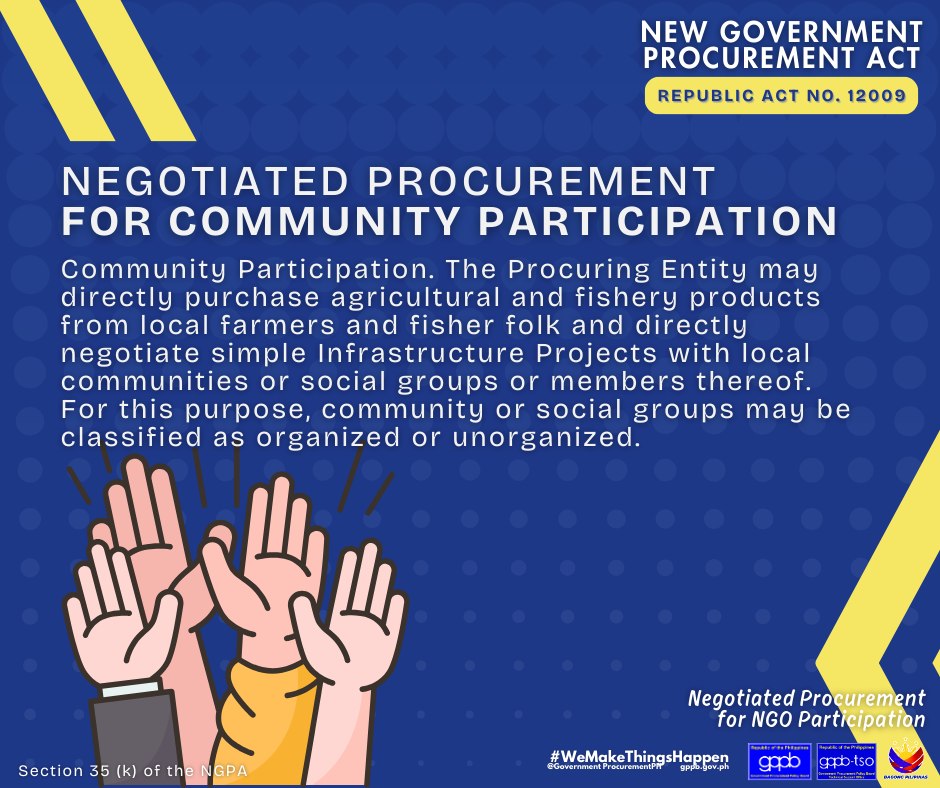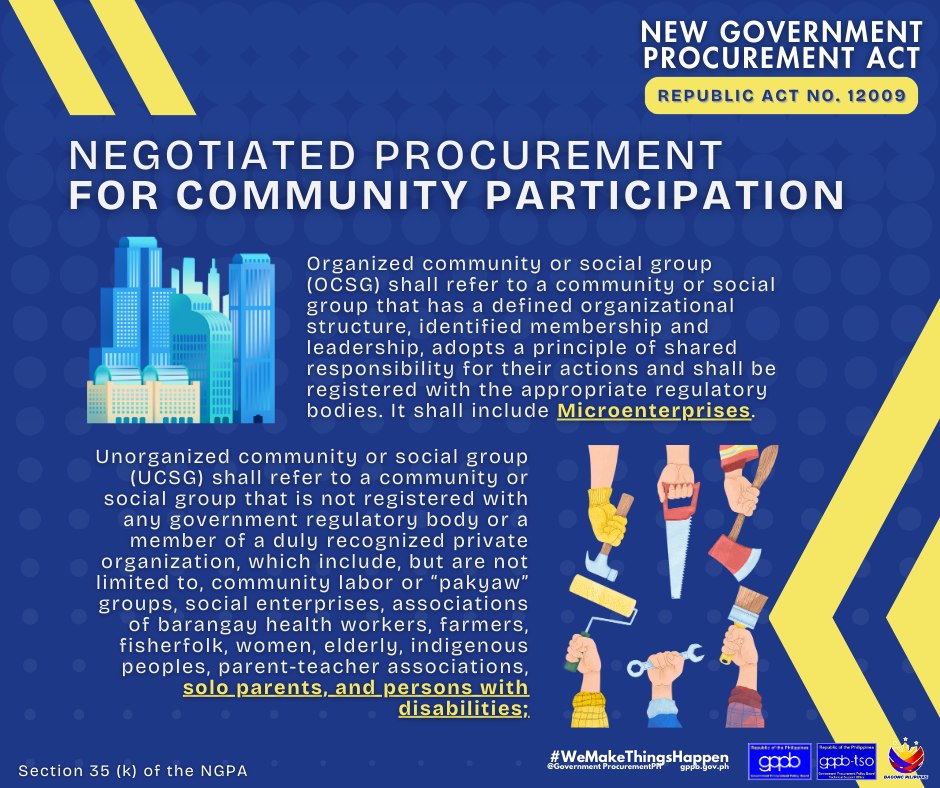


In 2021, the Government Procurement Policy Board (GPPB), through its Technical Support Office (TSO), has taken a significant step forward in enhancing community involvement in government procurement processes. Through the development of the Guidelines for Negotiated Procurement for Community Participation, as outlined in GPPB Resolution No. 18-2021, the GPPB aims to foster greater inclusivity and sustainability in community projects 𝘣𝘺 𝘪𝘯𝘴𝘵𝘪𝘵𝘶𝘵𝘪𝘰𝘯𝘢𝘭𝘪𝘻𝘪𝘯𝘨 𝘵𝘩𝘦 𝘱𝘳𝘰𝘤𝘦𝘥𝘶𝘳𝘦 𝘧𝘰𝘳 𝘵𝘩𝘦 𝘥𝘪𝘳𝘦𝘤𝘵 𝘱𝘶𝘳𝘤𝘩𝘢𝘴𝘦 𝘰𝘧 𝘈𝘨𝘳𝘪𝘤𝘶𝘭𝘵𝘶𝘳𝘢𝘭 𝘢𝘯𝘥 𝘍𝘪𝘴𝘩𝘦𝘳𝘺 𝘗𝘳𝘰𝘥𝘶𝘤𝘵𝘴 𝘧𝘳𝘰𝘮 𝘓𝘰𝘤𝘢𝘭 𝘍𝘢𝘳𝘮𝘦𝘳𝘴 𝘢𝘯𝘥 𝘍𝘪𝘴𝘩𝘦𝘳𝘧𝘰𝘭𝘬𝘴.
The said guidelines, designed to streamline procurement procedures, made it easier for local communities to participate in the delivery of goods and simple infrastructure projects. This initiative not only empowered local communities by enhancing their skills and capacities but also ensured that public projects were more attuned to the specific needs and aspirations of the communities they served. The successful implementation of these guidelines is expected to lead to more effective and efficient public procurement processes, ultimately benefiting both the government and the communities involved.
Thus, the New Government Procurement Act (NGPA) or Republic Act No. 12009 underscored the importance of community participation in achieving project sustainability and social objectives by adopting the Negotiated Procurement for Community Participation. The NGPA enhances this modality by widening its coverage to include microenterprises as part of the Organized Community or Social Group (OCSG) and solo parents and persons with disabilities as part of the Unorganized Community or Social Group (UCSG).
Community Participation under the NGPA allows the Procuring Entity to directly purchase agricultural and fishery products from local farmers and fisherfolk and directly negotiate simple infrastructure projects with local communities or social groups or their members. Community or social groups are classified as organized or unorganized:
![]() 𝗢𝗿𝗴𝗮𝗻𝗶𝘇𝗲𝗱 𝗖𝗼𝗺𝗺𝘂𝗻𝗶𝘁𝘆 𝗼𝗿 𝗦𝗼𝗰𝗶𝗮𝗹 𝗚𝗿𝗼𝘂𝗽 (𝗢𝗖𝗦𝗚):These groups have a defined organizational structure, identified membership and leadership, and adopt a principle of shared responsibility for their actions. They must be registered with the appropriate regulatory bodies and include Microenterprises.
𝗢𝗿𝗴𝗮𝗻𝗶𝘇𝗲𝗱 𝗖𝗼𝗺𝗺𝘂𝗻𝗶𝘁𝘆 𝗼𝗿 𝗦𝗼𝗰𝗶𝗮𝗹 𝗚𝗿𝗼𝘂𝗽 (𝗢𝗖𝗦𝗚):These groups have a defined organizational structure, identified membership and leadership, and adopt a principle of shared responsibility for their actions. They must be registered with the appropriate regulatory bodies and include Microenterprises.
![]() 𝗨𝗻𝗼𝗿𝗴𝗮𝗻𝗶𝘇𝗲𝗱 𝗖𝗼𝗺𝗺𝘂𝗻𝗶𝘁𝘆 𝗼𝗿 𝗦𝗼𝗰𝗶𝗮𝗹 𝗚𝗿𝗼𝘂𝗽 (𝗨𝗖𝗦𝗚):These groups are not registered with any government regulatory body or a member of a recognized private organization. They include community labor or “pakyaw” groups, social enterprises, associations of barangay health workers, farmers, fisherfolk, women, elderly, indigenous peoples, parent-teacher associations, 𝙨𝙤𝙡𝙤 𝙥𝙖𝙧𝙚𝙣𝙩𝙨, 𝙖𝙣𝙙 𝙥𝙚𝙧𝙨𝙤𝙣𝙨 𝙬𝙞𝙩𝙝 𝙙𝙞𝙨𝙖𝙗𝙞𝙡𝙞𝙩𝙞𝙚𝙨.
𝗨𝗻𝗼𝗿𝗴𝗮𝗻𝗶𝘇𝗲𝗱 𝗖𝗼𝗺𝗺𝘂𝗻𝗶𝘁𝘆 𝗼𝗿 𝗦𝗼𝗰𝗶𝗮𝗹 𝗚𝗿𝗼𝘂𝗽 (𝗨𝗖𝗦𝗚):These groups are not registered with any government regulatory body or a member of a recognized private organization. They include community labor or “pakyaw” groups, social enterprises, associations of barangay health workers, farmers, fisherfolk, women, elderly, indigenous peoples, parent-teacher associations, 𝙨𝙤𝙡𝙤 𝙥𝙖𝙧𝙚𝙣𝙩𝙨, 𝙖𝙣𝙙 𝙥𝙚𝙧𝙨𝙤𝙣𝙨 𝙬𝙞𝙩𝙝 𝙙𝙞𝙨𝙖𝙗𝙞𝙡𝙞𝙩𝙞𝙚𝙨.
This initiative promotes inclusivity in government procurement by encouraging the participation of local expertise, generating local employment, enhancing community capacity, and promoting the use of local materials and indigenous technology.
Together, let’s foster a nation where every community has the opportunity to contribute to and benefit from public projects. ![]()
![]()


